Product Details
Biotin Use in Horses
A sulfur and B vitamin critical to regulating metabolism, biotin cannot be naturally synthesized by horses (or humans). Biotin must be obtained by eating foods containing biotin or absorbed by intestinal flora capable of producing biotin. A horse’s main source of biotin is pasture forage, but a good amount of biotin can be found in alfalfa, barley, soybean meal and oats.
Biotin also produces keratin, collagen and elastin — all proteins essential for strong, healthy hooves and attractive coats. Collagen supports connective tissue, ligaments and tendons while elastin promotes joint flexibility.
Adding a biotin supplement for horses to the equine diet helps maintain hoof health and treats hoof conditions such as cracked/brittle hooves, chronic laminitis and dry, brittle hooves that are unable to hold shoes properly.
Benefits of Biotin-100 Supplement
Biotin not only supports hoof health, but also:
- Promotes cellular health and growth
- Is involved in producing fatty acids and metabolizing amino acids and fats
- Plays a vital role in fueling the citric acid cycle, a process needed to generate energy during heavy physical activity and respiration
- Helps maintain blood sugar levels
- Facilitates healing of some equine skin irritations
Biotin deficiencies in horses may cause deterioration of the equine hoof horn. A common problem affecting horse horns are sand cracks, or vertical cracks/fissures in the horn caused by brittleness and too-thin inner quarter walls. Unless treated promptly, sand cracks can get infected and potentially induce an acute lameness condition.
Other signs of a biotin deficiency in horses is recurring conjunctivitis, an eye inflammation causing the affected eye to discharge a clear or yellowish fluid that may or may not be thick with mucus. Horses with conjunctivitis will also shake their head from side to side because the eye itches or stings. Eyelids may be swelled, and severely affected eyes may be closed completely. While a biotin deficiency may be a primary cause of chronic conjunctivitis, other reasons for horses to suffer “pink eye” include secondary infections, eye trauma, undiagnosed congenital issues or the presence of numerous environmental irritants (heat, bugs, dust or pollen).
Biotin Dosage for Horses
To maintain optimal hoof health and general well-being in horses, feed your horse one rounded scoop of Kauffman’s® biotin supplement for horses twice a day. In addition to biotin, this proprietary blend of nutrients also provides your horse with mineral oil, and yeast cultures to promote overall equine health and well-being.
For more information about how your horse could benefit from KAUFFMAN’S Biotin-100 Supplement, please call Daniel Baum Company, Inc. today to speak to one of our equine experts.
Your Questions Answered
Ground Limestone, Rice Hulls, Yeast Culture, Biotin
To provide 15mg of Biotin, feed two scoops per horse per day.
Guaranteed Analysis:
| Per lb | Per 2 Scoops | |
| Biotin, min | 100 mg | 15 mg |
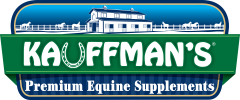
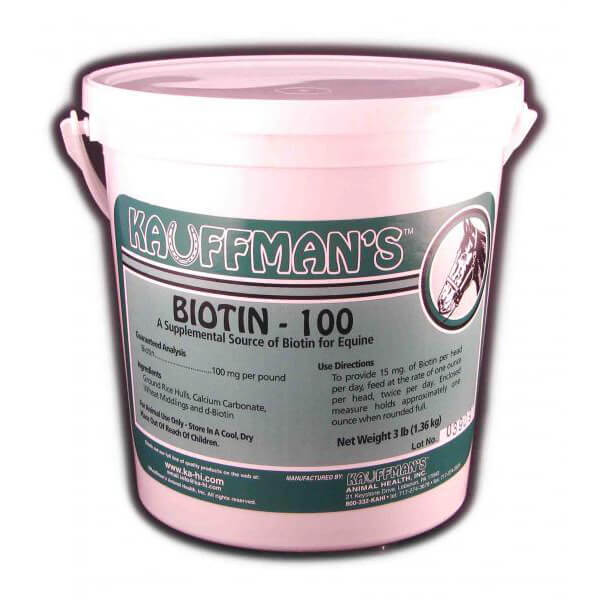
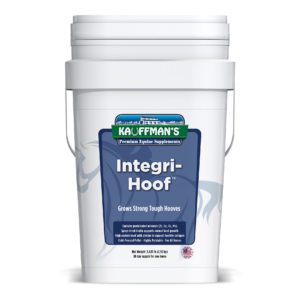
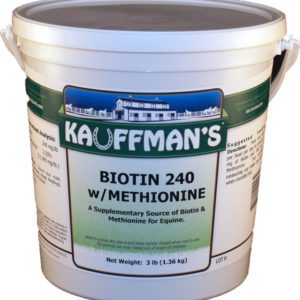
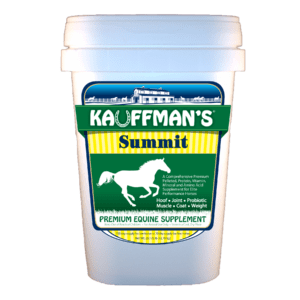
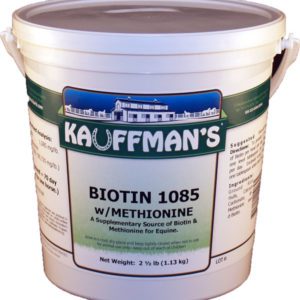
Reviews
There are no reviews yet.